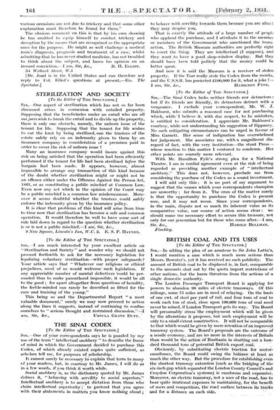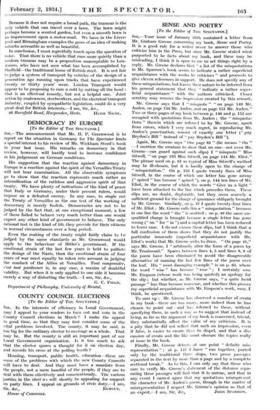BRITISH COAL AND ITS USES [To the Editor of Tux
SPECTATOR.]
Sia,—In adding the plea of an amateur to Sir John Latta's, I would mention a case which is much more serious than Messrs. Bowater's, yet it has received no such publicity. The amount of British coal to be displaced is, in fact, comparable to the amounts shut out by the quota import restrictions of other nations, but the harm threatens from the actions of a single domestic authority.
The London Passenger Transport Board is applying for powers to abandon 90 miles of electric tramways. Of this mileage, some 75 miles are in need of relaying. On the basis of one cwt. of steel per yard a rail, and four tons of coal to work each ton of steel, close upon 100,000 tons of coal need never be mined, if London Transport gets its way. The Board will-preStimablY 'stress 'the employment which will be given by thë alterathing it proposes, but Such employment Will be only to a small extent conitinctive It will not be comparable to that which would-be given by mere -retention of aii..impTin-rey1 tramway system.. The Board 7S proposals are the outeome of a Sessile economy and are no more in the interests of Britain than Woidet,be the action of Ritritania in shutting _out n hun- dred thousand tans of 'potential British export coal Obvionaly, " by substituting electric traction for motor omnibuses, the Board ccitild -Swing the bahniee at least as much the other way. But the proCedine fcireStabliShink eVen. the' shortest tramway ektendion (such as the bridging' of the six-inch gap which separated the London County Council's and Croydon Corporation's system's). is' cumbrous had eXpensivo. MorenVer, an electrie trainWaY,'Aot a uier of the "road, &is Co beat-quite irrational expenses" in -maintaining, for the 'benegt of users and eompetitOrS; the road surface between its tiaeks and for a distance on each side. Because it does not require a broad path, the tramcar is the only vehicle that can travel over a lawn. The lawn might perhaps become a .scented garden, but even a smooth lawn is an improvement upon a. motor-road. We have in the Liver- pool and Birmingham examples the germ of an idea of Making suburbs accessible as well as beautiful.
In conclusion, I must regretfully touch upon the question of noise. That there is no -vehicle that runs more quietly than a modern tramcar may be a .proposition unacceptable to Lon- doners, who have not seen what has been accomplished by Sheffield—the traditional home of British steel. It is not fair to judge a system of transport by vehicles of the design of a generation ago running upon tracks that have experienced twenty or thirty years' wear. London Transport would appear to be proposing to cure a cold by cutting off the head : t hat is an effectual remedy, but not a helpful one. Joint action by coalowners, steelworkers, and the electrical transport industry, coupled by sympathetic legislation, could do a very great deal for British interests.—! am, Sir, &c., 46 Barnfield Road, Harpenden, Herts. Huai' Nicor,.









































 Previous page
Previous page